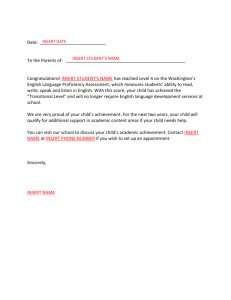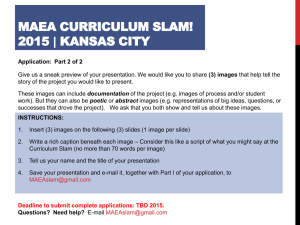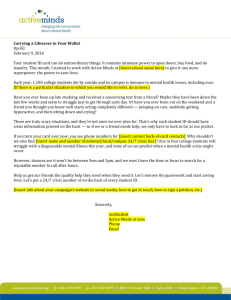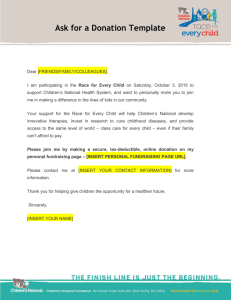INTRODUCTION TO METEOROLOGY EAS 120
advertisement
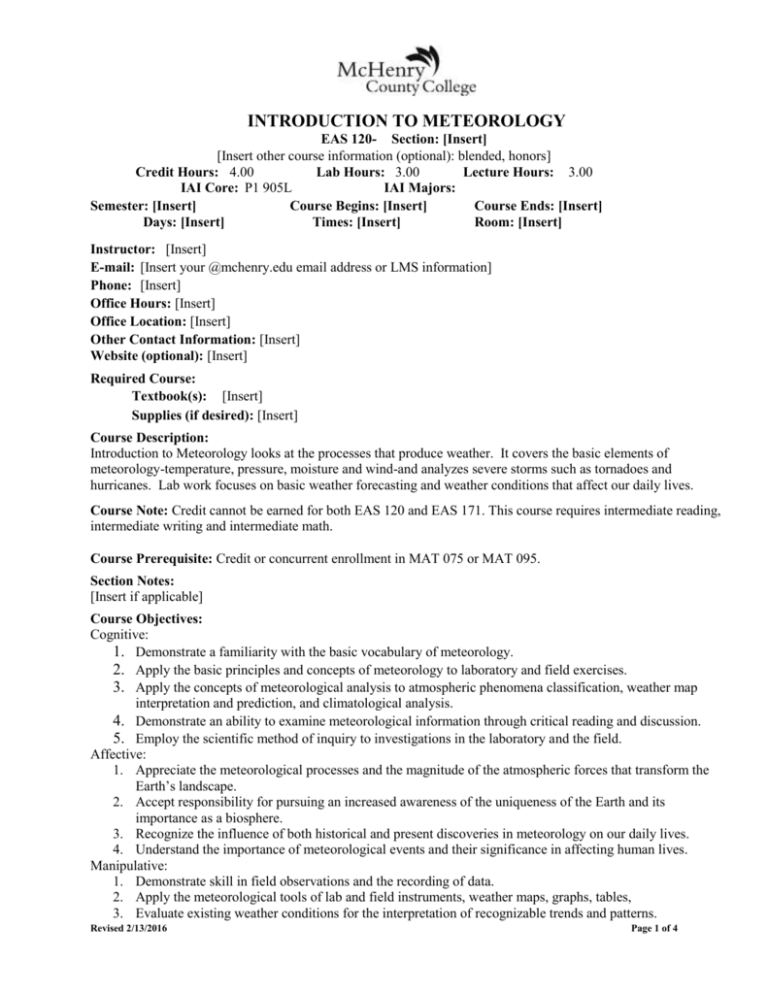
INTRODUCTION TO METEOROLOGY
EAS 120- Section: [Insert]
[Insert other course information (optional): blended, honors]
Credit Hours: 4.00
Lab Hours: 3.00
Lecture Hours: 3.00
IAI Core: P1 905L
IAI Majors:
Semester: [Insert]
Course Begins: [Insert]
Course Ends: [Insert]
Days: [Insert]
Times: [Insert]
Room: [Insert]
Instructor: [Insert]
E-mail: [Insert your @mchenry.edu email address or LMS information]
Phone: [Insert]
Office Hours: [Insert]
Office Location: [Insert]
Other Contact Information: [Insert]
Website (optional): [Insert]
Required Course:
Textbook(s): [Insert]
Supplies (if desired): [Insert]
Course Description:
Introduction to Meteorology looks at the processes that produce weather. It covers the basic elements of
meteorology-temperature, pressure, moisture and wind-and analyzes severe storms such as tornadoes and
hurricanes. Lab work focuses on basic weather forecasting and weather conditions that affect our daily lives.
Course Note: Credit cannot be earned for both EAS 120 and EAS 171. This course requires intermediate reading,
intermediate writing and intermediate math.
Course Prerequisite: Credit or concurrent enrollment in MAT 075 or MAT 095.
Section Notes:
[Insert if applicable]
Course Objectives:
Cognitive:
1. Demonstrate a familiarity with the basic vocabulary of meteorology.
2. Apply the basic principles and concepts of meteorology to laboratory and field exercises.
3. Apply the concepts of meteorological analysis to atmospheric phenomena classification, weather map
interpretation and prediction, and climatological analysis.
4. Demonstrate an ability to examine meteorological information through critical reading and discussion.
5. Employ the scientific method of inquiry to investigations in the laboratory and the field.
Affective:
1. Appreciate the meteorological processes and the magnitude of the atmospheric forces that transform the
Earth’s landscape.
2. Accept responsibility for pursuing an increased awareness of the uniqueness of the Earth and its
importance as a biosphere.
3. Recognize the influence of both historical and present discoveries in meteorology on our daily lives.
4. Understand the importance of meteorological events and their significance in affecting human lives.
Manipulative:
1. Demonstrate skill in field observations and the recording of data.
2. Apply the meteorological tools of lab and field instruments, weather maps, graphs, tables,
3. Evaluate existing weather conditions for the interpretation of recognizable trends and patterns.
Revised 2/13/2016
Page 1 of 4
Course Outline:
I. Composition, Structure, and Temperature of the Atmosphere
II. Moisture in the Atmosphere
A. Atmospheric Condensation
B. Cloud Development and Atmospheric Stability
C. Precipitation Processes
III. Movement of Air
A. Pressure and Wind
B. General Atmospheric Circulation
C. Air Masses and Fronts
IV. Atmospheric Disturbances
A. Mid-Latitude Cyclones
B. Thunderstorms and Tornadoes
C. Tropical Storms and Hurricanes
V. Human Activities
A. Weather Forecasting and Analysis
B. Human Effects on Weather
Laboratory Outline:
Lab 1: The Atmosphere
Lab 2: Solar Radiation and Seasons
Lab 3: Temperature Trends and Statistics
Lab 4: Atmospheric Pressure
Lab 5: Atmospheric Moisture
Lab 6: Surface Weather Map Analysis
Lab 7: Atmospheric Stability and Clouds
Lab 8: Air Masses and Frontal Zones
Lab 9: Introduction to Weather Forecasting and 15-Day Forecasting Contest
Lab 10: General Atmospheric Circulations
Lab 11: The Mid-Latitude Cyclone
Lab 12: Severe Storms
Lab 13: Tropical Disturbances
Lab 14: Weather Forecasting 2 and Daily Forecasting Contest and models to the examination and analysis of the
atmosphere.
Assignments and Grading Criteria
[Insert. Must include the value of each project, skill, exam, etc. as it relates to the final grade.]
Policies
Attendance policy: [Insert]
Late work/make-up policy: [Insert]
Weekly Course Schedule
Revised 2/13/2016
Page 2 of 4
[Insert date of each class meeting, topics to be covered, assignment due dates, testing dates, final exam date, etc.
Table format below is optional.]
Dates of
Class
Meetings
Course Schedule
Week #1
{Tentative Activity}
Week #2
{Tentative Activity}
Week #3
{Tentative Activity}
Week #4
{Tentative Activity}
Week #5
{Tentative Activity}
Week #6
{Tentative Activity}
Week #7
{Tentative Activity}
Week #8
{Tentative Activity}
Week #9
{Tentative Activity}
Week #10
{Tentative Activity}
Week #11
{Tentative Activity}
Week #12
{Tentative Activity}
Week #13
{Tentative Activity}
Week #14
{Tentative Activity}
Week #15
{Tentative Activity}
Week #16
{Tentative Activity}
Teaching Schedule
The scheduling of the activities and teaching strategies on this syllabus, but not the objectives or content, may be
altered at any time at the discretion of the instructor.
Withdrawals: The last day to drop this course is [Insert date according to Important Class Dates for term
https://catalog.mchenry.edu/syllabi/Pages/default.aspx]. Failure to attend class does not constitute official
withdrawal. If students are considering a withdrawal, they should consult directly with the instructor and an academic
advisor. Students may withdraw from a class through the Registration Office, either in person or by fax: (815) 4553766. In their request, students should include their name, student ID number, course prefix, number and section,
course title, instructor, reason for withdrawing, and their signature. Withdrawal from a course will not be accepted over
the telephone.
Academic Support for Special Populations Students
Revised 2/13/2016
Page 3 of 4
Students with Disabilities:
It is the policy and practice of McHenry County College to create inclusive learning environments. If you are a
student with a disability that qualifies under the American with Disabilities Act – Amended (ADAA) and require
accommodations, please contact the Access and Disability Services office for information on appropriate policies
and procedures for receiving accommodations and support. Disabilities covered by ADAA may include learning,
psychiatric, and physical disabilities, or chronic health disorders. Students should contact the Access and
Disability Services office if they are not certain whether a medical condition/disability qualifies. To receive
accommodations, students must make a formal request and must supply documentation from a qualified
professional to support that request. However, you do not need to have your documentation in hand for our first
meeting. Students who believe they qualify must contact the Access and Disability Services office to begin the
accommodation process. All discussions remain confidential. The Access and Disability Services office is located
in Room A260 in A Building in the Atrium. To schedule an appointment to speak with the manager, please call
(815) 455-8766. Information about disabilities services at MCC can be found at: www.mchenry.edu/access
Additional syllabus information and resources can be found at www.mchenry.edu/syllabusinfo.
STUDENTS ARE RESPONSIBLE FOR KNOWING ALL SYLLABUS INFORMATION.
Revised 2/13/2016
Page 4 of 4



